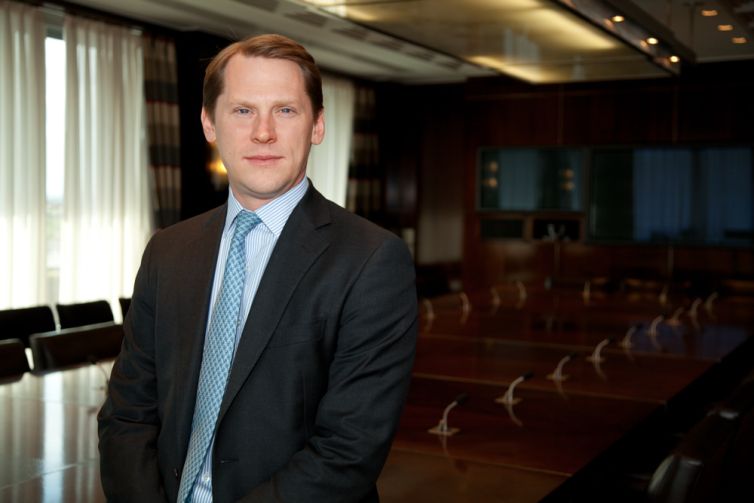Blackstone Group’s Robert Harper Talks Living and Investing in Europe
By Liam La Guerre August 5, 2015 9:45 am
reprints
The dollar is up. The euro is down. The old world nibbles on its fingernails as investors hypothesize what’s going to happen with Greece…
Making it not a bad time to be an American real estate investor in Europe—precisely what Robert Harper is.
Mr. Harper, a 13-year Blackstone (BX) Group veteran, oversees the private equity giant’s European real estate debt group out of London. He sat down (by phone) with Commercial Observer to talk about the latest developments on his side of the pond.
Mr. Harper, who received his Bachelor of Science from the McIntire School of Commerce at the University of Virginia in 2000 and later joined Morgan Stanley’s real estate private equity group in California, shed light on Europe’s brighter side in mid-2015.
He’s on the lookout for opportunities in an in flux Ireland. He’s navigating Spain’s real estate waters. He’s evaluating concerns with Greece’s near default. In short, Mr. Harper has had a lot to deal with in a variety of territories on the continent since transitioning to the United Kingdom.
And, he added, raising a family in London is a lot less of a headache than doing so in New York, where he started at Blackstone.
Commercial Observer: Where did you grow up in the States?
Mr. Harper: Chevy Chase, Md., which is right outside of Washington, D.C.
When did you move to London?
I started with Blackstone in 2002 in the New York office and moved to our London office in 2011, so I’ve been here for four years.
What are the major differences between New York and London for you?
London is a wonderful city to live in from a personal perspective. It’s kind of nice to live outside the U.S. and get a non-American take on the world.
My wife and I were married with no kids in New York, so we enjoyed the restaurants, nightlife and more hectic places in the city. We have two small kids now, and London is a little bit less frantic, so it’s a good place to raise a family. It’s also close to a lot of interesting places in Europe where I get to travel to for business. So if I get up at five in the morning for work, I’m not going to Chicago for the 37th time, I’m going to Madrid or Barcelona or Paris. It’s a nice change of pace.
What about on the business side of things?
New York is a melting pot—but I’d say London even more so. You have all the cultural diversity of the European continent in London, even though it’s not physically on the continent. It’s the business hub for Western Europe and there are a lot of international students and business people coming through town, as well as foreigners from all over the place that live and work here.
Are there differences in your day-to-day work life?
The work is very similar in terms of the types of deals that we find attractive and the types of deals in which we want to invest. But in the U.S., you have the benefit of it being one country where information flows pretty freely and where there’s plenty of transparency. Europe is a bit more siloed with all the geographic differences between countries and languages, legal systems and tax codes. You don’t have the same transparency about what’s happening in the markets. Buying an office building in Germany is different than buying one in Spain, so that creates some complexities that you don’t have in the U.S.
What does your role as the head of Europe for Blackstone Real Estate Debt Strategies entail?
I oversee our real estate debt group for Europe, which consists of a team based in London, but we cover all of Europe. We have two vehicles, our limited partner-based fund BREDS [Blackstone Real Estate Debt Strategies] and our mortgage REIT Blackstone Mortgage Trust [BXMT], which is listed on the NYSE, but also invests in Europe.
Through those vehicles, we can originate senior loans and mezzanine loans, provide construction financing and buy loans to trade in the market, whether it’s in portfolio format from banks that are selling down loans that they’d like to get off their balance sheets, or individual syndicated positions of capital stacks and CMBS bonds.
How is the business performing right now?
Business has been growing rapidly over the past couple of years with the acquisition of the GE Capital loan book that we recently completed. We have been able to find interesting deals, whether it’s through the GE acquisition or through relationships or tracking deals where there is a financing need.
Obviously, we have been most well known as an equity investor in real estate for more than 20 years now and all the information that we have gained from investing globally in the equity business helps us make smart decisions on the debt side, whether it’s the private debt fund or more recently in the BXMT mortgage REIT. So we are basically broadening the scope of what we do within the real estate industry.
We are trying to span the whole capital stack here from higher yielding equity to senior debt. If there is an interesting real estate deal out there, we have a vehicle that could invest in that opportunity.
What kinds of investment changes are you seeing with the Greek crisis and broader Eurozone turmoil?
While Greece represents some risk to the Eurozone, there is still a lot of opportunity that exists due to the distress of the prior cycle as the excess of 2007 and that era works its way through the system. So lots of capital, mainly on the equity side, has been raised to invest in distressed European opportunities and that’s buying assets from liquidated funds or banks that have had to repossess them and things like that and asset manage these assets. There are a lot of those deals going on and those deals continue to attract equity and they need debt, and a lot of the banks have kind of pulled back and are less active on the lending front, which creates an opportunity for us. So you have all that going on as kind of the major theme in Europe today and across the continent. And it hasn’t slowed down in a material way given the Greece situation, at least not yet.
Has the Greek crisis affected Blackstone’s interests at all?
Greece hasn’t been a market that we have invested in, nor has it been a market where we have looked for potential deals. So the direct impact to our real estate business in Europe has been very, very minimal. Obviously, we’re concerned about how it would affect the financial system as a whole and debt and equity markets across Europe.
How often do you work with New York sponsors on debt deals in Europe?
Pretty frequently. There is obviously a lot of American money [here]. And a lot of our lending is relationship-based. So if we know these groups in the U.S.—maybe lent money to them in the U.S. and now they are focused on Europe—these are groups that we know well and we like to repeat business with people with whom we’ve had a good experience. As the equity comes over, we, as a debt provider, also come over and work with it, and continue to work with some of the same people. We obviously work separately with European sponsors as well, given the geography, but the U.S. relationships are valuable to us in Europe today.
What asset classes are you most focused on in Europe?
We don’t stray too far from the fairway. We are generally more comfortable with the major property types: logistics, hotel, office and retail. We don’t do a lot of stuff that is funkier in terms of specialized asset classes. We’re more comfortable in the primary product types and generally in major markets where there is liquidity both in good times and in bad times. So that’s something that we try to stick to both in the U.S. and Europe for the broad majority of our deals.
In terms of European countries and cities, where are you seeing the most activity?
London is incredibly active as kind of the economic capital of Europe. There has been a lot of demand for real estate both from occupiers as well as capital providers looking to invest in London. So that’s been a very significant opportunity.
Paris also remains an active market. It’s one of the more desirable locations within Europe.
Ireland has been very, very active over the past couple of years. They have obviously taken a lot of pain and turned things around there relatively quickly and you have a lot of multinational, global companies like Google and others, a lot in the tech sector, that have chosen to locate there. So there is a lot of positive economic momentum in Ireland focused on Dublin today.
In Spain, with a focus on Madrid and Barcelona, there has been a lot going on with equity going there and looking for deals and deals being available by banks and other owners looking to sell assets that they have had to take over during the crisis.
Germany is the biggest economy on the continent and obviously there is stuff to do there as well, and Italy I would say, is emerging more and more as a place where activity is increasing.
Blackstone has been very active in Spain over the past couple of years. What’s the story there?
The equity has been attracted to Spain because of the availability of deals. So when you have distressed funds or banks selling assets, or if you have government-sponsored bad banks, like Sareb, selling assets or loan pools, the equity is attracted by the availability of deals.
On the debt side, we’re attracted because there is a need for our capital, because the local banking sector is not as strong as it was during the last cycle and isn’t funding as many deals, particularly some of the ones that are maybe more value-add or transitional in nature. So the velocity for deals has really picked up.
What is one of the more interesting deals on which your team recently worked?
There was a U.K. hospitality portfolio called De Vere Villages that was put up for sale by Lloyds, the bank that had taken it over during the downturn, given overleverage and failure from the prior sponsor. They had marketed it for sale and KSL—an American private equity firm, with whom we have a good relationship—ended up being the winning bidder and we gave them a loan against that acquisition. We funded a £315 million [$492 million] whole loan and subsequently sold down the senior loan and kept a mezzanine loan for our fund. So it was a pretty large loan on a high-quality portfolio of hotels across the U.K. with a really high-quality sponsor that we knew well from the U.S.
Hotels are a sector in which I think we have a competitive advantage. Not all banks like financing hotels due to the operating nature of the asset. We’re well suited to it given all of the hospitality experience we have, whether it’s investing on the equity side, or being a lender to the industry throughout the U.S. and Europe.
You worked on Hilton Worldwide, which Blackstone took public in December 2013. What was that experience like?
Yeah, I was back in our New York office and I worked on the deal team when we bought the company in 2007. And then really worked on the deal all the way through 2011, when I moved over to Europe. It’s a great business. Obviously, the investment went through some tough times during the downturn, but we had bought a wonderful world-class business that has performed through all of that. It is performing quite nicely post-IPO and has ended up being a very successful deal for us.
What was your specific role when Hilton went public?
I was part of the deal team doing the market due diligence, the company diligence, the financial modeling and everything from working towards signing the deal and then ultimately closing it and then financing it.
What was the hardest part of it?
The hardest part of it all was going through the downturn. We made a very large investment in what we knew was a great business and we had underwritten it to be able to withstand a downside scenario and an economic shock. It was just that the economic shock that we got was more severe than we had hoped for. But given the quality of the company and the business model, it was able to withstand that shock, while many other lodging deals that were done in 2007 ended up in foreclosure or bankruptcy or some other situation like that. And Hilton did not because it had a great business model that was able to withstand the shock.
What are you plans for the rest of 2015 and next year?
We are still growing the real estate debt business. While our equity business has been around for more than 20 years, our debt business really started in 2008 and, in Europe, it’s more recent than that. We got up and running in the U.S. a couple of years before we really focused on the European expansion, so we’ve got a great opportunity in Europe for both our private BREDS funds and our BXMT mortgage REIT. And we are very focused on growing those businesses and making them market leaders in the debt investment space in Europe. So that’s really the focus for the rest of this year and the next few years—continue the path to get the business where it should be.
—Additional reporting by Damian Ghigliotty


